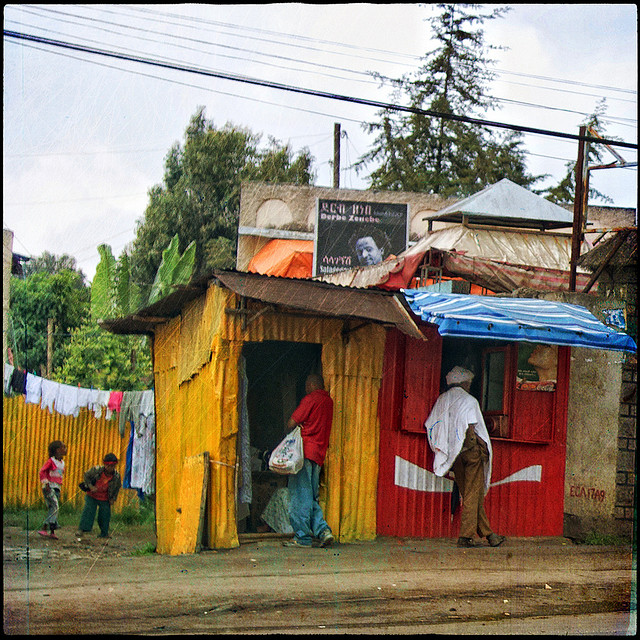I’ve been reading a book published just last year by Daniel Mains titled Hope is Cut: Youth, Unemployment, and the Future in Urban Ethiopia. Mains spent the better part of 2 years living in Jimma and documenting the lives about about 30 young men as they lived from day to day, tried to find work, hung out with friends, etc. He tracked their finances and eavesdropped on many conversations to figured out what made them tick and what cultural forces were driving their situations and what their motivations and challenges were. The book is an academic piece of anthropology and so it wasn’t a thrilling page-turner. Mains also spends most of the time laying out the facts and explaining the situation, not drawing conclusions. That is what a proper study if this kind should do. Still, I found many of his anecdotes fascinating, both as I try to understand Ethiopian culture specifically, the state of Africa more generally, and make connections with how life is shaping up in the United States as well.
The unemployment rate in urban Ethiopia is a rather staggering 50%. We in the west freak out about rates of 10%. Still, I think many of the forces at work in Africa are the same ones we are experiencing here. We are still propped up by piles of cash and property so we don’t see how similar our situations are. One common theme is the false hope of education. Today we have a growing crisis of young people who have accumulated huge amounts of debt going to college only to find that no job can be found afterwards except something in retail or food service. How many coffee baristas have graduate degrees these days? A lot! In Ethiopia too, education has been heavily invested in this past century. It’s been portrayed as a savior of sorts – the thing that will rescue our children from the backwards rural countryside. Nearly all the men in Mains’s study had completed high school and even some college. They were dramatically more educated than their parents. Yay! But there were no jobs for them. There is a glut of graduates but only a handful of modern well-paying work. BUT, they have been conditioned their whole life to expect something better. They don’t want to work as a barista making $0.50 a day. They can’t go back to the coffee plantation either since they moved to the city. What is to be done? It’s similar to how we told all our children in the West that they could grow up and be astronauts. Now they feel trapped and unsatisfied working in a cubical as a junior accountant. The same thing happened in rapidly modernized Africa: The kids were told they could get a meaningful job working for some government service ministry. A few did, but a huge chunk were left with nothing but a diploma and no prospects. For many of the young men interviewd (typically in their late twenties and early thirties), moving out of the country was seen as one of the only viable options to get un-stuck.
Still, at least in Ethiopia, everywhere he went he still found that people were optimistic about education. He points out that this can’t be sustained in other places.
The powerful faith in the value of education that I encountered in Jimma may be contrasted with other studies that describe increasing cynicism toward schooling as education fails to produce tangible economic benefits. For example, in a study among the Manu people of Papua New Guinea, Demerath (2003) found that most students were highly critical of education, rebelled against teachers and authority, and valued school primarily for its role in creating social relationships with peers. Despite the struggles that secondary school graduates faced in finding work, in urban Ethiopia the belief in the value of education was still quite strong at the time of my research.
-Daniel Mains, Hope is Cut: Youth, Unemployment, and the Future in Urban Ethiopia, p.73
Just as with our public schools here, “teaching to the test” is a big problem.
The long-standing obsession of students with the Ethiopian School Leaving Certificate Examination (ESLCE) demonstrates that education leads to work not because it provides skills but because it provides a certificate and official credentials. Essentially, the ESLCE was the test that determined whether one’s twelve years of schooling were wasted time or the first step toward government employment. During my experience teaching English in an Ethiopian secondary school as a Peace Corps volunteer, students with little speaking ability could easily conjugate English verbs in the present perfect tense. This was a reflection of students’ prioritization of preparing for the grammar portion of the ESLCE over learning English communication skills. For most students the process of education was about preparing for a test that would eventually provide them with access to government employment.
-p.74
In Ethiopia failing one’s matriculation exam closed off all possibilities for a successful future, but migration enabled opportunity and success that could eventually be brought home.
-p.141
There was a song on the radio a lot from a few years back called “Boston” where a young woman dreams of moving away from dead-end California and starting over fresh in New England. “I gotta get out of this town!” to get ahead is a thought that often passes through young people’s minds. In Ethiopia, relocation is seen as providing similar ways of getting unstuck, thought the focus was often on maturing to becoming a provider and sending money back home rather that some sort of isolated sense of self-fullfilment. The connection to family and friends is still very strong there. You don’t strike out on your own to be on your own, but so you can come back around in a better situation than you left earlier. Most of the young men in Main’s study desperately WANTED to become providers instead of dependents but were discouraged that taking a low-wage job wouldn’t do enough to change that. They still couldn’t get married unless things changed more dramatically.
It seems that in the west, young men in their thirties have an easier time staying home and playing XBox in the evenings and making a few booty calls to their lady acquaintances on the weekend. We’ve made it pretty comfortable for folks to stay in their non-adult limbo state. Their frustration is numbed by a plethora of digital entertainment options available as well as (seemingly) consequence-free sex. It also helps that food can be had for cheap. In the capital-poor nations in Africa and Asia though, this frustration is thick in some places, driving young men (in Pakistan for example) to join the Taliban to try and get unstuck.
What is the solution to all of this? The author mentions that westerners who endeavour to study Africa often end up in a very cynical state. I can see how it would be easy to arrive there! People analyzing the west don’t have it much better if they try to see long-term. Secularists often have nowhere to turn to in the end except nihilism. Bill Gates and his foundation spend billions of dollars aiding Africa, but their stated underlying goal is population control. They have no eschatology so there is no ultimate end except the establishment of some sort of sustainable infertility.
I don’t believe that can save us. I believe that only Christ can save us. The answer to this and every other terribly complex problem is the Gospel. What does that look like on the ground? That’s our task to realize. One life lived would only see the tip of the iceberg.


